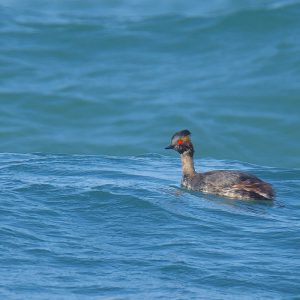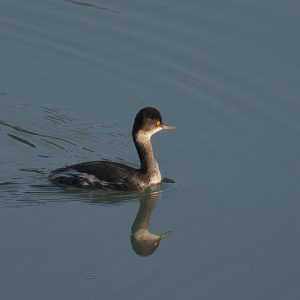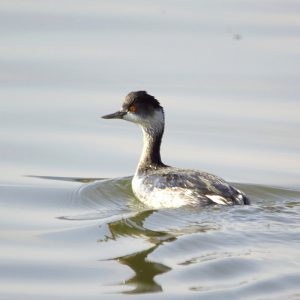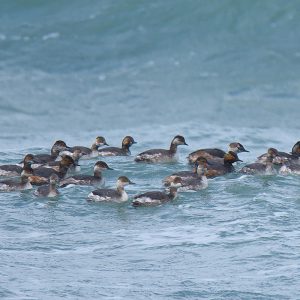自然
むなかたで見ることがでみる野鳥の図鑑です
むなかたの野鳥
ハジロカイツブリ
| 種目 | ハジロカイツブリ (羽白鳰) | 分類 |
カイツブリ目 カイツブリ科 カンムリカイツブリ属 |
学名 | Podiceps nigricollis | 英名 | Black-necked Grebe |
|---|---|---|---|---|---|---|---|
|
ハジロカイツブリ (羽白鳰) |
カイツブリ目 カイツブリ科 カンムリカイツブリ属 |
Podiceps nigricollis | Black-necked Grebe |
宗像市でみられる場所・時期
冬鳥。11月~3月にかけて,神湊から鐘崎にかけての海岸から,沖に浮かんでいる群れを見ることができる。神湊や鐘崎などの漁港内で間近にみられることもある。
特徴
全長31cm。同じ仲間のカイツブリよりも一回り大きい。雌雄同色。
冬羽は,頭部から上が黒く,顔は白いが,顔の白黒の境界は不明瞭で,ぼやけている。目の後ろ,首の前側,胸,脇が白っぽく,その他は暗褐色で,2色ツートンに見える。虹彩は赤く目立つ。
夏羽は,頭部から胸,上面が黒く,目の後方に金栗色の飾り虹彩は赤く,目立つ。
習性
小群か群れで生活するものが多いが,春先には大群になる。冬期には単独で行動する個体を見ることもある。
群れでいる場合には,一斉に海中に潜り採餌する。潜水時間は比較的長く,潜った場所から思った以上に遠方に浮上することも多い。
分布
日本列島沿岸,東シナ海中・南部,南シナ海北部の沿岸で越冬する。
米国西部(アラスカを除く)の太平洋沿岸,中米の沿岸部,エーゲ海沿岸等でも越冬する。
繁殖地は,シベリア沿海州付近,アメリカ合衆国,カナダ南部の内陸部,東ヨーロッパからロシアにかけての内陸部となっている。
その他
夏羽と冬羽では一見別の鳥と見間違うほどが意見が異なる。宗像では,完全な夏羽を見ることは少ないが,3月末頃に夏羽に換羽中の群れを見ることもある。
 はじめに
はじめに お問い合わせ
お問い合わせ


